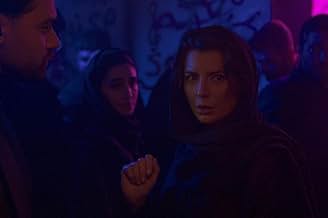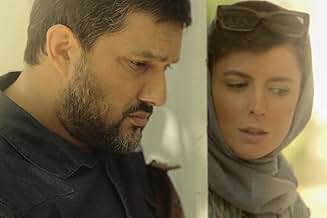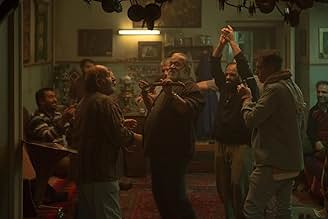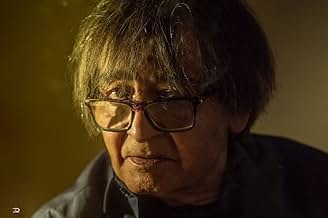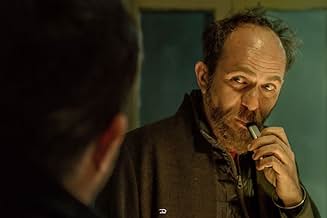Pir Pesar
- 2024
- 3 h 12 min
AVALIAÇÃO DA IMDb
8,1/10
1 mil
SUA AVALIAÇÃO
Adicionar um enredo no seu idiomaTwo Iranian brothers live with their abusive father. When he rents to a young woman planning to marry her, her attraction to the older son creates tension in their already fractured family.Two Iranian brothers live with their abusive father. When he rents to a young woman planning to marry her, her attraction to the older son creates tension in their already fractured family.Two Iranian brothers live with their abusive father. When he rents to a young woman planning to marry her, her attraction to the older son creates tension in their already fractured family.
- Prêmios
- 3 vitórias e 1 indicação no total
Avaliações em destaque
The Old Boy is one of those rare cinematic experiences that captivates the viewer from its very first moments. With a cohesive narrative, well-crafted dialogue, and deep character development, this film not only delivers a satisfying movie experience, but it lingers in the viewer's mind long after the credits roll.
The film's greatest strength lies in its flawless combination of storytelling, acting, and visual design. The visual effects are stunning-not only do they enhance the scenes, but they help define the tone of the film. The meticulous production design and lighting distinguish The Old Boy from many domestic and even international productions.
The performances are exceptional. The cast is perfectly chosen, and each actor brings a unique psychological depth to their character. The ensemble's chemistry is clearly felt, and it keeps the story grounded in believability at every moment.
Despite having a relatively classic narrative structure, the film surprises the audience with creative and powerful moments. Its key plot points are smartly placed and paced without any rush, creating a balanced rhythm that feels neither too slow nor too fast.
Ultimately, The Old Boy is a successful example of cinema that appeals to both mainstream audiences and artistic sensibilities. It deserves to be watched, analyzed, and praised.
The film's greatest strength lies in its flawless combination of storytelling, acting, and visual design. The visual effects are stunning-not only do they enhance the scenes, but they help define the tone of the film. The meticulous production design and lighting distinguish The Old Boy from many domestic and even international productions.
The performances are exceptional. The cast is perfectly chosen, and each actor brings a unique psychological depth to their character. The ensemble's chemistry is clearly felt, and it keeps the story grounded in believability at every moment.
Despite having a relatively classic narrative structure, the film surprises the audience with creative and powerful moments. Its key plot points are smartly placed and paced without any rush, creating a balanced rhythm that feels neither too slow nor too fast.
Ultimately, The Old Boy is a successful example of cinema that appeals to both mainstream audiences and artistic sensibilities. It deserves to be watched, analyzed, and praised.
The Old Bachelor," directed by Oktay Barahani, was for me more than just a typical drama. With Hassan Pourshirazi's outstanding performance as Gholam Bastani, the film skillfully portrays the archetype of the "Puer Aeternus" or "Eternal Youth." This character, despite his age, remains emotionally stunted, refusing to embrace the responsibilities of adulthood.
This interpretation is reinforced by Gholam's own pivotal dialogue: "A man whose life has no rules or order, even if he grows old, will remain an old boy and never truly grow up!" Furthermore, one can observe echoes of "Dionysus," the god of ecstasy and liberation, within Gholam Bastani, which perfectly complements the "Eternal Youth" aspect of his character. This is a profound and thought-provoking film that delves into the psychological layers of humanity.
This interpretation is reinforced by Gholam's own pivotal dialogue: "A man whose life has no rules or order, even if he grows old, will remain an old boy and never truly grow up!" Furthermore, one can observe echoes of "Dionysus," the god of ecstasy and liberation, within Gholam Bastani, which perfectly complements the "Eternal Youth" aspect of his character. This is a profound and thought-provoking film that delves into the psychological layers of humanity.
I stayed with the film until the end. As we were leaving the cinema, most people seemed to be praising it. But I couldn't shake the feeling that something was off-I wasn't satisfied. I asked myself: beyond all its claims, what kind of experience did this film actually give me?
Pirpesar, directed by Oktay Baraheni, is a long film that manages to keep the viewer engaged-not through the strength of its storytelling, but by relying on familiar cinematic devices like romantic rivalry and erotic suggestion that cleverly manipulate the audience's attention. The film tries to appear profound and impactful, but the message it claims to carry is no more compelling than its flawed narrative execution.
Much of the film is weighed down by unnecessary and poorly constructed scenes, and several performances are noticeably weak. The director's limited understanding of key characters results in portrayals that feel shallow or misguided. The film's conceptual contradictions do not stem from its literary references-such as The Brothers Karamazov or Shahnameh-but from weak authorship and a lack of narrative coherence. While one or two actors do shine, overall this is not a successful film. It's a work that, more than anything else, seems crafted to satisfy the pseudo-intellectual viewer who's looking for symbolic depth where little truly exists.
Pirpesar, directed by Oktay Baraheni, is a long film that manages to keep the viewer engaged-not through the strength of its storytelling, but by relying on familiar cinematic devices like romantic rivalry and erotic suggestion that cleverly manipulate the audience's attention. The film tries to appear profound and impactful, but the message it claims to carry is no more compelling than its flawed narrative execution.
Much of the film is weighed down by unnecessary and poorly constructed scenes, and several performances are noticeably weak. The director's limited understanding of key characters results in portrayals that feel shallow or misguided. The film's conceptual contradictions do not stem from its literary references-such as The Brothers Karamazov or Shahnameh-but from weak authorship and a lack of narrative coherence. While one or two actors do shine, overall this is not a successful film. It's a work that, more than anything else, seems crafted to satisfy the pseudo-intellectual viewer who's looking for symbolic depth where little truly exists.
10Ahmiek-2
A new outlook for a persian movie. Director all does his best and a great scenario performed. The casting is great leila hatami a great Iranian actress acting well and pourshirazi is just too good despite his character's mental complications. Btw I think this movie will achieve international praises. Just like what asghar farhadi did to iran cinema.
Loneliness and the struggle to maintain a relationship are concepts that are intensely highlighted in Pirpesar (The Old Bachelor). Oktay Baraheni's film, with a deep and dramatic gaze into a patriarchal Iranian family, attempts to depict the psychological and social complexities of its members. In this family, where the father's authoritarian dominance overshadows all relationships, the characters grapple not only with external pressures but also with their own internal conflicts. Baraheni skillfully portrays the clash between two generations and two opposing mindsets-one firmly rooted in old traditions and the other striving for change and an independent identity in the modern world. Beneath these generational conflicts, the despair and struggle to preserve family bonds under harsh circumstances are vividly portrayed, where every movement and word of the characters seem to echo an internal battle for peace and balance in a male-dominated world.
The father, played masterfully by Hassan Pourshirazi, is the embodiment of a patriarchal system whose dominance extends beyond the social sphere into the psychological and emotional realms of his family. While maintaining an outward display of authority, this tyrannical father wrestles with internal crises and contradictions, which the film gradually unveils. His character reveals that those who appear powerful on the surface may be plagued by deep psychological wounds and struggles. Though he controls his family with absolute authority, he represents an older generation whose dominance seems unshakable. However, the screenplay skillfully dismantles this authority, gradually passing the power down to the next generation-his children.
And then there is Hamed Behdad-an actor who, with his exceptional command of body language and dialogue, precisely conveys the shadow of patriarchal oppression hanging over the next generation. His character struggles to overcome his father's authoritarian rule, and through his outstanding performance, free of any unnecessary dialogue or exaggeration, he captures the profound emotional turmoil of his character with just his gaze. His eyes become the unspoken language of his character, conveying love, respect, defeat, and authority with silent intensity. Through his mastery of acting in silence, Behdad crafts moments where words become irrelevant, and only the raw emotions and internal struggles of his character remain visible. He compellingly portrays the psychological conflicts of a man caught in the crises of life-conflicts that every Pirpesar (The Old Bachelor). (elder son) must face: societal pressures, submission, and the fight to preserve his identity and place in the world. His performance not only reveals the essence of his character but also humanizes the struggle against oppression and inner doubts in a deeply tangible way.
Mohammad ValiZadegan, playing the younger brother, serves as Behdad's counterpart. He represents a generation torn between tradition and familial pressures, searching for freedom and personal identity. In his portrayal, the conflict between youthful rebellion and submission to his father's dominance is evident. He continuously seeks his own path in a world ruled by his father, and this internal struggle is reflected in his every move and word.
Among these powerful performances, Leila Hatami delivers a striking presence. Her character appears elegant and composed on the surface but harbors profound disappointment and disillusionment within. She is a woman caught between submission and resistance against male dominance and societal pressures. Hatami's character serves as a mirror to the condition of women in a patriarchal society-women who cannot effectively make their voices heard against oppression. She embodies the deep despair and frustration of women in such environments, bringing a poignant portrayal of gender inequality and societal limitations to the silver screen.
The old house, used as the film's primary setting, symbolically reflects the decaying layers of a patriarchal society. A crumbling home that mirrors the state of the family within it-filled with remnants of the mother who is no longer present, scattered bottles, and cigarette butts, all signaling collapse. The dim lighting and framing help the audience grasp the suffocating reality of the household. Though the balance of this deteriorating home is repeatedly disrupted throughout the film, the writer does not allow it to completely fall apart. Instead, the filmmaker leaves the audience to ponder: should this house be completely destroyed, or should it remain partially standing?
While Pirpesar (The Old Bachelor) tells a local and family-oriented story, it also addresses deeper, universal themes such as dominance, gender inequality, and generational conflict. With its powerful performances and psychological depth, the film has gained international recognition at film festivals. Despite its culturally specific narrative, it successfully conveys universally human themes in a manner accessible to diverse audiences worldwide. This quality sets it apart from many similar works and secures its success on a global scale.
Baraheni takes the audience to the edge of an abyss but ensures they do not fall. He awakens buried pain and resentment before their eyes, skillfully avoiding excessive dialogue while bringing unspoken truths to light.
Pirpesar(The Old Bachelor) is a three-hour invitation to reflect on both internal and external struggles in a patriarchal and oppressive world-a world teetering on the brink of collapse with every passing moment.
The father, played masterfully by Hassan Pourshirazi, is the embodiment of a patriarchal system whose dominance extends beyond the social sphere into the psychological and emotional realms of his family. While maintaining an outward display of authority, this tyrannical father wrestles with internal crises and contradictions, which the film gradually unveils. His character reveals that those who appear powerful on the surface may be plagued by deep psychological wounds and struggles. Though he controls his family with absolute authority, he represents an older generation whose dominance seems unshakable. However, the screenplay skillfully dismantles this authority, gradually passing the power down to the next generation-his children.
And then there is Hamed Behdad-an actor who, with his exceptional command of body language and dialogue, precisely conveys the shadow of patriarchal oppression hanging over the next generation. His character struggles to overcome his father's authoritarian rule, and through his outstanding performance, free of any unnecessary dialogue or exaggeration, he captures the profound emotional turmoil of his character with just his gaze. His eyes become the unspoken language of his character, conveying love, respect, defeat, and authority with silent intensity. Through his mastery of acting in silence, Behdad crafts moments where words become irrelevant, and only the raw emotions and internal struggles of his character remain visible. He compellingly portrays the psychological conflicts of a man caught in the crises of life-conflicts that every Pirpesar (The Old Bachelor). (elder son) must face: societal pressures, submission, and the fight to preserve his identity and place in the world. His performance not only reveals the essence of his character but also humanizes the struggle against oppression and inner doubts in a deeply tangible way.
Mohammad ValiZadegan, playing the younger brother, serves as Behdad's counterpart. He represents a generation torn between tradition and familial pressures, searching for freedom and personal identity. In his portrayal, the conflict between youthful rebellion and submission to his father's dominance is evident. He continuously seeks his own path in a world ruled by his father, and this internal struggle is reflected in his every move and word.
Among these powerful performances, Leila Hatami delivers a striking presence. Her character appears elegant and composed on the surface but harbors profound disappointment and disillusionment within. She is a woman caught between submission and resistance against male dominance and societal pressures. Hatami's character serves as a mirror to the condition of women in a patriarchal society-women who cannot effectively make their voices heard against oppression. She embodies the deep despair and frustration of women in such environments, bringing a poignant portrayal of gender inequality and societal limitations to the silver screen.
The old house, used as the film's primary setting, symbolically reflects the decaying layers of a patriarchal society. A crumbling home that mirrors the state of the family within it-filled with remnants of the mother who is no longer present, scattered bottles, and cigarette butts, all signaling collapse. The dim lighting and framing help the audience grasp the suffocating reality of the household. Though the balance of this deteriorating home is repeatedly disrupted throughout the film, the writer does not allow it to completely fall apart. Instead, the filmmaker leaves the audience to ponder: should this house be completely destroyed, or should it remain partially standing?
While Pirpesar (The Old Bachelor) tells a local and family-oriented story, it also addresses deeper, universal themes such as dominance, gender inequality, and generational conflict. With its powerful performances and psychological depth, the film has gained international recognition at film festivals. Despite its culturally specific narrative, it successfully conveys universally human themes in a manner accessible to diverse audiences worldwide. This quality sets it apart from many similar works and secures its success on a global scale.
Baraheni takes the audience to the edge of an abyss but ensures they do not fall. He awakens buried pain and resentment before their eyes, skillfully avoiding excessive dialogue while bringing unspoken truths to light.
Pirpesar(The Old Bachelor) is a three-hour invitation to reflect on both internal and external struggles in a patriarchal and oppressive world-a world teetering on the brink of collapse with every passing moment.
Principais escolhas
Faça login para avaliar e ver a lista de recomendações personalizadas
Detalhes
- Data de lançamento
- País de origem
- Idioma
- Também conhecido como
- The Old Bachelor
- Empresa de produção
- Consulte mais créditos da empresa na IMDbPro
- Tempo de duração3 horas 12 minutos
- Cor
Contribua para esta página
Sugerir uma alteração ou adicionar conteúdo ausente


![Assistir a Trailer [OV]](https://m.media-amazon.com/images/M/MV5BNDAyMzdjYmEtZDY2ZC00ODdmLTkyNjAtNDAxZGFmMmJiZmZjXkEyXkFqcGdeQXRyYW5zY29kZS13b3JrZmxvdw@@._V1_QL75_UX500_CR0)
